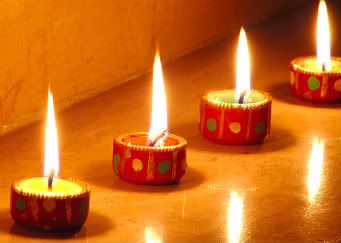HISTORY
Diwali or Dīpāvali (Sanskrit: a row of lamps) is a significant festival in Hinduism, Buddhism, Sikhism, and Jainism, and an official holiday in India. Adherents of these religions celebrate Diwali as the Festival of Lights. They light diyas—cotton string wicks inserted in small clay pots filled with oil—to signify victory of good over the evil within an individual.
In Hinduism, across many parts of India and Nepal, it is the homecoming of Rama after a 14-year exile in the forest and his victory over Ravana. In the legend, the people of Ayodhya (the capital of his kingdom) welcomed Rama by lighting rows (avali) of lamps (dĭpa), thus its name: dīpāwali. In South India, it marks the victory of Krishna over Narakasura. Over time, this word transformed into Diwali in Hindi and Dipawali in Nepali, but still retained its original form in South and East Indian Languages. In Dravidian languages it is called as Deepavali and the same is used in Malaysia and Singapore.
In Jainism, Diwali marks the attainment of nirvana by Mahavira on 15 October, 527 BC.
Diwali has been significant in Sikhism since the illumination of the town of Amritsar commemorating the return of Guru Har Gobind Ji (1595-1644), the sixth Guru of Sikhism, who was imprisoned along with 52 other Hindu kings at Fort Gwalior by Emperor Jahangir. After freeing the other prisoners, he went to the Harmandir Sahib (Golden Temple) in the holy city of Amritsar, where he was welcomed happily by the people who lit candles and divas to greet the Guru. Because of this, Sikhs often refer to Diwali also as Bandi Chhorh Divas - "the day of release of detainees."
The festival is also celebrated by Buddhists in Nepal, a majority-Hindu country, particularly the Newar Buddhists.
In India and Nepal, Diwali is now considered to be a national festival, and the aesthetic aspect of the festival is enjoyed by most Indians and Nepalese regardless of faith.
On the day of Diwali / Deepavali, many wear new clothes and share sweets and snacks. Some North Indian business communities start their financial year on Diwali and new account books are opened on this day.
Diwali or Dīpāvali (Sanskrit: a row of lamps) is a significant festival in Hinduism, Buddhism, Sikhism, and Jainism, and an official holiday in India. Adherents of these religions celebrate Diwali as the Festival of Lights. They light diyas—cotton string wicks inserted in small clay pots filled with oil—to signify victory of good over the evil within an individual.
In Hinduism, across many parts of India and Nepal, it is the homecoming of Rama after a 14-year exile in the forest and his victory over Ravana. In the legend, the people of Ayodhya (the capital of his kingdom) welcomed Rama by lighting rows (avali) of lamps (dĭpa), thus its name: dīpāwali. In South India, it marks the victory of Krishna over Narakasura. Over time, this word transformed into Diwali in Hindi and Dipawali in Nepali, but still retained its original form in South and East Indian Languages. In Dravidian languages it is called as Deepavali and the same is used in Malaysia and Singapore.
In Jainism, Diwali marks the attainment of nirvana by Mahavira on 15 October, 527 BC.
Diwali has been significant in Sikhism since the illumination of the town of Amritsar commemorating the return of Guru Har Gobind Ji (1595-1644), the sixth Guru of Sikhism, who was imprisoned along with 52 other Hindu kings at Fort Gwalior by Emperor Jahangir. After freeing the other prisoners, he went to the Harmandir Sahib (Golden Temple) in the holy city of Amritsar, where he was welcomed happily by the people who lit candles and divas to greet the Guru. Because of this, Sikhs often refer to Diwali also as Bandi Chhorh Divas - "the day of release of detainees."
The festival is also celebrated by Buddhists in Nepal, a majority-Hindu country, particularly the Newar Buddhists.
In India and Nepal, Diwali is now considered to be a national festival, and the aesthetic aspect of the festival is enjoyed by most Indians and Nepalese regardless of faith.
On the day of Diwali / Deepavali, many wear new clothes and share sweets and snacks. Some North Indian business communities start their financial year on Diwali and new account books are opened on this day.
adapted from www.wikipedia.org
HAPPY DEEPAVALI
